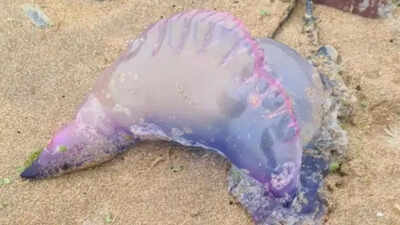An urgent warning has been issued to the public after several Portuguese Man O’ War, also nicknamed “Floating Terrors,” were discovered on a popular Welsh beach. The Port Talbot Coastguard confirmed sightings at Aberavon Beach and urged visitors to remain cautious and avoid contact as reported by The Sun. Similar reports have recently emerged from the coasts of Pembrokeshire, Gwynedd, and Anglesey, prompting growing concern among local authorities.Officials emphasised that even though these creatures may appear lifeless, their venomous tentacles retain the ability to sting long after death. The Coastguard has begun efforts to remove the dangerous specimens from affected beaches to prevent accidental injuries.
Portuguese Man O’ War: A venomous drifter with deadly tentacles drifitng UK shores
Despite their jellyfish-like appearance, the Portuguese Man O’ War is not a jellyfish but a siphonophore, a colony of individual organisms that function together as a single unit. According to the Wildlife Trusts, the species is easily recognisable by its large translucent purple float, often tinged with pink, and its long, trailing blue tentacles that can extend up to several metres.These tentacles contain venom-filled sacs known as nematocysts, which can paralyse and kill small fish and other marine creatures. For humans, a sting can cause intense pain, blistering, and welts, and in some cases, can lead to fever, respiratory distress, or anaphylaxis; a potentially life-threatening allergic reaction. The Portuguese Man O’ War cannot swim and instead drifts across the ocean, propelled by winds and surface currents. Stormy weather and strong onshore winds often push them towards the UK coastline, where they can become stranded. Experts note that sightings increase after periods of rough sea conditions, particularly during the autumn and winter months.Once washed ashore, their vibrant colours and jellyfish-like shape may attract curiosity from beachgoers, but touching them even accidentally can lead to painful consequences.
Safety guidelines to protect beachgoers from venomous stings
Authorities have issued strict safety guidance to help minimise the risk of stings from these venomous creatures:
- Avoid touching any Portuguese Man O’ War, even if it appears to be dead.
- Rinse the affected area with seawater (not fresh water) if stung, as fresh water can trigger more venom release.
- Remove any attached tentacles using a flat object like a credit card—never with bare hands.
- Immerse the stung area in hot water (as hot as can be tolerated) to help neutralise toxins.
- Seek immediate medical assistance if symptoms worsen or if a severe reaction occurs.
The Coastguard continues to monitor the situation and is working with local councils to clear the beaches and issue public alerts where needed.
Portuguese Man O’ War rising threat on UK beaches
Usually seen floating across the open waters of the Atlantic Ocean, the Portuguese Man O’ War relies entirely on winds and ocean currents for movement. In recent years, sightings in the Mediterranean, particularly near Mallorca and Menorca, have prompted temporary beach closures due to safety concerns.A carnivorous predator, the Man O’ War paralyses small fish, shrimp, and plankton with its venom before drawing them into its digestive structures for consumption. Despite its fearsome reputation, it faces threats from a few remarkable ocean dwellers such as loggerhead turtles, blue sea slugs, and the man-of-war fish, which has uniquely adapted to live safely among its venomous tentacles. The recent warning across Welsh beaches highlights a rise in these dangerous creatures washing ashore, reminding the public to stay cautious as ocean currents and storm patterns continue to carry them closer to UK shores. The recent warning across Welsh beaches highlights a rise in these dangerous creatures washing ashore, reminding the public to stay cautious as ocean currents and storm patterns continue to carry them closer to UK shores. Go to Source


